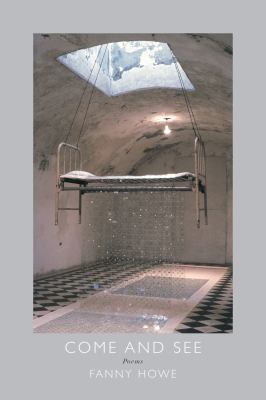
Reviewed August 10, by Daniel DeKerlegand.
To say that Fanny Howe's most recent collection of poetry Come and See is a paean to place might seem wrong if that conception of place were indeed limited to the margins of cartography. Still, as the title indicates, the book beckons the reader to witness the experience of vision, particularly painful vision, in a multitude of spaces. For Howe, the trauma of sight is rendered religiously, such as in the poem “On the Wall” where “A map of heaven / shows clouds / for each soul / being prayed for.” In her verse, the souls of martyred individuals continually transmigrate across landscapes, via the permutability of the line.
Howe is not afraid to utilize the adjective in order to characterize the experience of space, but her adjectives never function simply as a coloration of experience. Instead, the “thundering young” in the poem “The Rachmaninoff Hotel” themselves embody a natural experience of a tumultuous space. Furthermore, Howe uses the adjective to seemingly indict her own experience of space in the “wood-perfumed room” where she clings to “a velveteen spread.” Thus, each adjective manifests itself within a sociopolitical context, as the speaker characterizes her own privilege and affirms “we wanted to kill those who are now us.”
Via her exploration of a media of witness, as in the poem “After Watching Klimov's Agoniya,” Howe examines the cultural panopticon of violence, including her own distanced perception of vestiges of violence. Often, this seeing transposes itself upon the body of the seer, as in the line “The photographs of Rasputin's face make me wish I could meet him and vomit.” Thus, the seer actively seeks a closer proximity to the violent act, though the violent acts themselves, even as artifacts, retain a certain nauseating power, as “to the seeker all objects are lonely and dangerous.” Still, how can the seeing of these artifacts, including Agoniya, redeem the distanced witness? Ultimately, for Howe the redemption lies in a negative theology and thus her search for wisdom is a Gnostic one. She invokes the director, writing “Turgenev wonders if it is possible that all tears and prayers of people / Can be fruitless? No, he protests. The indifference of nature / Is a foretaste of eternity and its mercy.” Thus, Howe's active seeing of suffering— through records or artifacts of suffering— exists in inverse proportion to the mercy of death. Her insistence upon seeing the Other in its human form bears a resemblance to the ethics of Lévinas, in that the I becomes truly accountable for itself only when it encounters the immediacy of another human being.
Howe, however, seems to extend her encounter with the Other to the natural, as in the poem “The Grotto” where she enacts a reconciliation of the duality between inner and outer, through the visionary power of the poetic mind. The speaker of the poem requests of the Other, “Let's make believe we're lying / together on our backs,” which, through the imperative, bequests the reader— as the Other— to take part in this transformation of consciousness (12). The ambiguity of the signifier “lying,” emphasized by the line break, reflects the paradoxical relationship between dishonesty and creation. The poem continues by stating:
The lumps in the floor are dirt and grass
and the blackbirds tickle us with their claws
until we chirp and laugh.
This is fearlessness.
Through her use of the present tense, Howe allows the speaker— and thus the reader, who has accepted the request— to literally exist within this alternate reality, in which the outer space of nature pervades the inner space of the house. Thus, the “lumps in the floor” are literally “dirt and grass” within the self-contained reality of the ritual; this is, in a sense, the transfiguration. The ability to accept this “lying,” for Howe, is “fearlessness,” which marks the self as the poem gradually returns to the quotidian concerns of the inner space:
You sip cold water from a silver glass.
I climb back upstairs with a hot water bag.
Tomorrow I get everything we need.
I mean today. I did.
The first two lines of the stanza restore the self and the Other to the architecture and objects of the house, where “you sip cold water from a silver glass” and “I climb back upstairs with a hot water bag.” However, the self-revision of the last two lines, in which Howe replaces “tomorrow” with “today,” signifies a shift in the self, where the speaker realizes that it has obtained “everything we need” via the transfiguration in poetic creation. Though Come and See is in some ways distinctly Catholic, its spiritual concerns extend beyond any categorical bounds due to its necessity to see the Other in all of its forms, and to engage with human suffering in a visceral manner. The proximity of Howe's poetic mind, through the fearlessness of her speaker's engagement with the external and reverence for the image, brings us as close as we can manage to a seeing of the world and its trauma, in hopes that we too can account for ourselves.